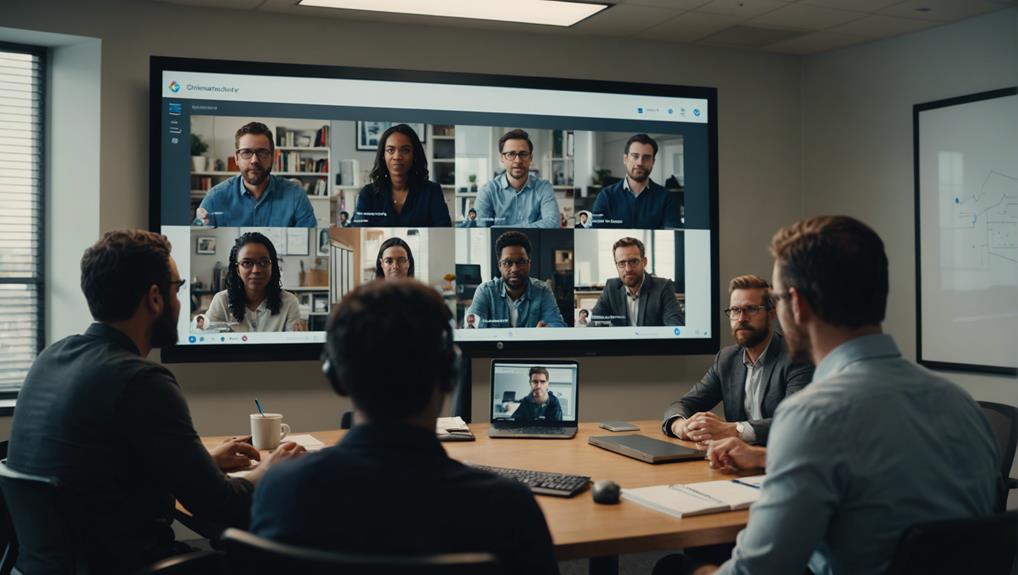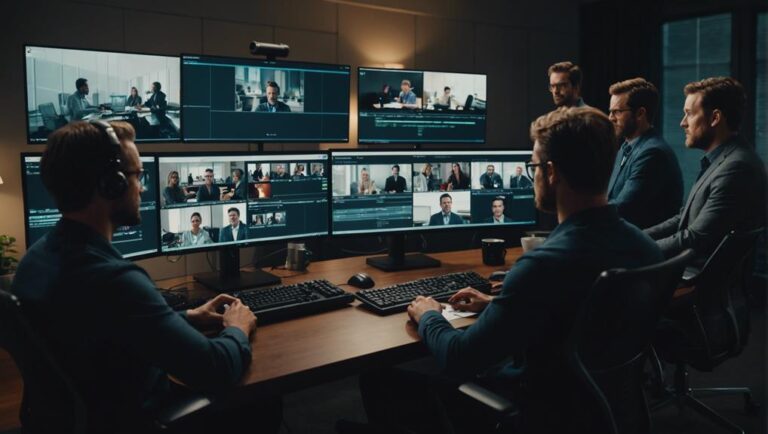Encouraging Collaboration and Knowledge Sharing in Remote Teams
To foster effective collaboration and knowledge sharing in remote teams, prioritize transparent communication and use collaborative tools. Establish clear communication channels, schedule virtual meetings, and create centralized platforms. Encourage active participation with engaging questions, safe idea sharing, and structured feedback. Cultivate continuous learning through peer mentoring, workshops, and online courses aligned with team goals. Implement digital collaboration platforms, open communication, virtual team-building activities, and cross-functional teams. Recognize and reward collaborative efforts to boost team cohesion, creativity, and problem-solving. Explore strategies for maximizing collaboration and knowledge sharing to enhance team dynamics and productivity.
Building Trust Among Remote Team Members
To foster collaboration in remote teams, consistently prioritize building trust among team members through transparent communication and active engagement. Team bonding is essential for creating a cohesive and productive remote team.
One effective way to enhance team bonding is by incorporating virtual icebreakers into your team meetings or communication platforms. These icebreakers can help team members get to know each other on a more personal level, fostering a sense of connection and camaraderie despite the physical distance.
Virtual icebreakers come in various forms, such as fun quizzes, virtual team-building games, or even virtual coffee breaks where team members can chat informally. By incorporating these activities into your remote team's routine, you can create opportunities for team members to interact outside of work-related tasks, strengthening their relationships and building trust.
Establishing Clear Communication Channels
Enhance remote team collaboration by establishing clear communication channels that facilitate seamless interaction and information sharing among team members. Important communication protocols are essential for maintaining strong team dynamics in a remote setting. Clearly outline expectations for communication frequency, preferred channels, and response times to make sure everyone is on the same page.
Virtual meetings play a significant role in fostering real-time discussions and enhancing collaboration among remote team members. Schedule regular virtual meetings to keep everyone engaged, address any challenges promptly, and celebrate successes together. Encourage active participation and create an inclusive environment where all team members feel comfortable sharing their thoughts and ideas.
Information sharing is crucial for remote teams to stay informed and aligned. Establish a centralized platform for sharing documents, updates, and project milestones. Ensure that information is easily accessible and organized to facilitate collaboration and decision-making.
Leveraging Collaborative Tools and Platforms
Maximize remote team collaboration by integrating various collaborative tools and platforms into your workflow. Virtual brainstorming sessions are a great way to engage your team members in creative idea generation regardless of their physical location.
Utilize online workshops to facilitate interactive learning experiences and skill development among team members. Collaborative platforms offer a centralized space for sharing documents, communicating in real-time, and organizing project tasks efficiently.
When choosing collaborative tools, consider the specific needs of your team and the nature of your projects. Look for platforms that support both synchronous and asynchronous communication to accommodate different working styles and time zones.
Encourage team collaboration by setting clear guidelines for tool usage and providing training to make sure everyone is comfortable with the technology.
Encouraging Active Participation in Discussions
To foster active participation in discussions within your remote team, encourage engagement by posing thought-provoking questions and actively listening to responses.
Create a safe and open environment where team members feel comfortable sharing their ideas and perspectives.
Engage Team in Discussions
Get your remote team actively involved in discussions by creating a welcoming and inclusive environment that encourages open participation and diverse perspectives. To kickstart engagement, initiate brainstorming sessions where team members can freely share ideas and suggestions. Encourage everyone to contribute without judgment, fostering a collaborative atmosphere where creativity thrives. This approach not only generates innovative solutions but also cultivates a sense of ownership and investment in the team's goals.
Moreover, prompt team members to share insights from their unique perspectives and experiences. Encouraging the sharing of insights enables individuals to contribute their expertise, leading to more well-rounded discussions and thorough decision-making.
Foster Open Communication
Encourage active participation in discussions by fostering open communication within your remote team. Create a collaborative environment where diverse perspectives are valued and shared freely. To achieve this, consider organizing regular brainstorming sessions where team members can openly contribute ideas, ask questions, and engage in constructive dialogue. These sessions not only facilitate knowledge sharing but also promote a sense of inclusivity and teamwork.
Additionally, incorporating team building exercises into your remote work routine can help strengthen relationships and trust among team members. Activities like virtual escape rooms, online trivia games, or collaborative projects can foster a sense of camaraderie and improve communication channels within the team. By creating opportunities for informal interactions, you can enhance overall team dynamics and encourage active participation in discussions.
Facilitating Virtual Knowledge Sharing Sessions
How can you effectively facilitate virtual knowledge sharing sessions to enhance collaboration within remote teams?
To kickstart engaging sessions, begin by brainstorming ideas with team members to establish topics of interest. Utilize video conferencing tools to create a dynamic environment where knowledge exchange flows seamlessly.
Encourage active participation by assigning roles such as discussion leader or note-taker to keep the session organized. Emphasize the importance of sharing diverse perspectives to foster innovation and creativity within the team.
During the session, implement interactive activities like virtual whiteboards or breakout rooms to stimulate collaboration. Guarantee that all team members have the opportunity to contribute and ask questions to enhance understanding.
Utilize real-time chat features to encourage continuous dialogue and idea sharing. To maximize the effectiveness of the session, summarize key takeaways and action items at the end, ensuring that everyone is aligned on the next steps.
Implementing Structured Feedback Mechanisms
To enhance collaboration within remote teams, consider implementing structured feedback mechanisms as a way to gather valuable insights and drive continuous improvement. Feedback surveys and peer evaluations are powerful tools that can provide team members with constructive feedback on their performance and contributions.
Feedback surveys can be conducted periodically to gather input on team dynamics, communication effectiveness, and areas for improvement. Peer evaluations, on the other hand, allow team members to provide feedback on each other's work, promoting a culture of accountability and mutual support.
Cultivating a Culture of Continuous Learning
What steps can you take to foster a culture of continuous learning within your remote team?
Encouraging peer mentoring can be a powerful tool in cultivating a learning environment. Pair team members with different skill sets or experiences to share knowledge and insights.
Additionally, organizing virtual workshops on relevant topics can provide opportunities for team members to learn from experts or each other.
Online training is another valuable resource to promote continuous learning. Utilize online platforms to offer courses that align with your team's goals and individual development needs. Encourage team members to engage in these courses and share their learnings with the rest of the team.
Skill sharing sessions can also enhance the culture of continuous learning within your remote team. Set up regular sessions where team members can showcase their expertise or teach others new skills. This not only fosters a collaborative environment but also ensures that knowledge is continuously circulating within the team.
Conclusion
To sum up, remote teams thrive on trust, communication, and collaboration. Are you ready to take your team to the next level by implementing these strategies?
By fostering a culture of knowledge sharing and continuous learning, you can create a strong and cohesive team that achieves success even from a distance.
Embrace the power of collaboration and watch your remote team flourish!







